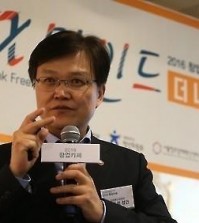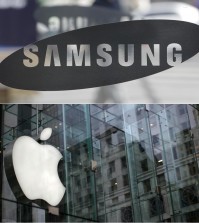- California Assembly OKs highest minimum wage in nation
- S. Korea unveils first graphic cigarette warnings
- US joins with South Korea, Japan in bid to deter North Korea
- LPGA golfer Chun In-gee finally back in action
- S. Korea won’t be top seed in final World Cup qualification round
- US men’s soccer misses 2nd straight Olympics
- US back on track in qualifying with 4-0 win over Guatemala
- High-intensity workout injuries spawn cottage industry
- CDC expands range of Zika mosquitoes into parts of Northeast
- Who knew? ‘The Walking Dead’ is helping families connect
Most popular international firms in Korea: Google, Apple, Starbucks
According to JobKorea survey
By Lee Hyo-sik
U.S.-based multinational firms have consistently topped the list of most sought-after workplaces among university graduates in Korea over the years, because of their high wages and generous employee welfare programs.
 Close behind are German and other European companies, which have attracted a large number of local jobseekers looking to work in companies with a Western corporate culture that provide an opportunities to work abroad.
Close behind are German and other European companies, which have attracted a large number of local jobseekers looking to work in companies with a Western corporate culture that provide an opportunities to work abroad.
According to a recent survey of about 2,000 jobseekers, conducted by employment portal JobKorea, Google Korea was the most favored workplace among foreign companies operating in Korea, followed by Apple Korea and Starbucks Korea.
BMW Korea and Yuhan-Kimberly came in fourth and fifth, respectively, with Nike Korea at sixth, Louis Vuitton Korea at seventh, 3M Korea at eighth, L’Oreal Korea at ninth and Gucci Korea at 10th.
Nearly 42 percent of the respondents said they want to work at foreign companies for their employee-friendly and generous benefit programs, followed by the Western corporate culture at 17.9 percent, opportunities to work overseas at 17.5 percent and high wages at 14.6 percent.
Khang Sung-wook, president and CEO of GE Korea, said working in a diverse environment is one of the key factors why Korean jobseekers look for opportunities at foreign firms. “One of the key benefits from working at multinational companies is learning about how operations and management work in various markets and cultures.”
Chris Kenneally, president of Tetra Pak Korea, shared Khang’s view, saying there are ample opportunities for employees at foreign companies to work within a global team.
Many Korean jobseekers are also drawn to the corporate culture and career opportunities at non-Korean firms, according to Shashi Maudgal, CEO of Novelis Asia.
He said employees feel they can succeed as a professional and perform better in an organization that promotes values such as respect for people, regardless of hierarchy, open and honest communication, work-life balance and employee empowerment.
Simon Bureau, CEO of Vectis Corp. and former chairman of the Canadian Chamber of Commerce in Korea, said money or benefits are not the main reasons why Koreans want to work at foreign companies.
“Opportunities with large Korean firms are increasingly limited for university graduates as they create fewer jobs than in the past,” he said. “In addition, many jobseekers, who did not graduate from top universities, realize that they cannot achieve a career that develops their full potential at a Korean firm. Global companies are less sensitive to academic credentials and more eager to hire people based on talent and passion.”
Bureau said a growing number of young Koreans have realized that their personality and aptitude are a better match with global firms, adding that they can better perform under the corporate culture of a global company.
“A career with a foreign company is also attractive to young Korean women. Generally speaking, foreign companies provide better support programs and infrastructure for career women. In addition, the narrower income gap between genders and better long-term opportunities for senior promotions are more favorable for women.”















